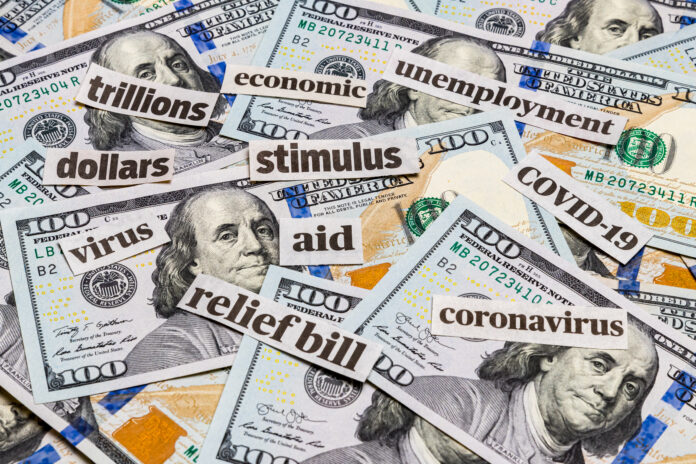
Today, the House of Representatives passed the Senate version of the $1.9 trillion COVID-19 aid reconciliation bill, coined the “American Rescue Plan.”
The House passed its first version of the budget reconciliation measure on February 26 by a 219-212 vote. The bill was then sent to the Senate, which passed 50-49 on March 6 after extensive amendments during a “vote-a-rama” process. Overall, the bill provides funding, program changes, and policies aimed at providing relief to American workers and families during the ongoing COVID-19 pandemic.
Below is a breakdown of the $1.9 trillion COVID-19 aid reconciliation bill.
Agriculture & Nutrition
Congress appropriated over $10 billion towards agriculture and nutrition, which will aid programs aimed to strengthen food supply chain, resources to purchase and distribute commodities to nonprofits, health care access for rural communities, and debt forgiveness and relief for socially disadvantaged farmers and ranchers. This aid is intended to provide much needed relief to the agriculture industry after it has taken a large hit from the pandemic, particularly related to supply chain.
The new relief package also includes measures to expand and extend benefits through programs such as Food for Peace, SNAP, WIC, and EBT.
Tax Provisions
Several tax provisions are included in the bill which result in changes to the Paycheck Protection Program (PPP) and child tax credits (CTC).
A section of the bill includes a measure to increase funding for PPP by $7.25 billion, expands eligibility for the program, and allows for loan forgiveness for COBRA premium payments. This allocation is just a fraction of what was allocated to PPP in the last COVID relief package. The following groups are now eligible for PPP: tax-exempt groups, larger non-profits, and online new publishers.
The relief package also includes changes and expansions to the child tax credit. Changes include making the CTC fully refundable instead of partially refundable, which means it could be a tax refund if it exceeds one’s income tax liability. The credit is also increased to $3,600 for children under 6 and $3,000 for children 7-17.
Aid to Businesses and Schools
Businesses such as bars and restaurants hurt by the pandemic will receive $25 billion in aid to help cover costs of rent, utilities, payroll, and other operational expenses.
K-12 schools will receive $130 billion in aid to assist with reducing class sizes, modifying classrooms to improve social distancing, installation of ventilation systems, purchase of PPE, and hiring of more staff to accommodate students’ needs and provide summer school. Colleges and universities will see $40 billion in increased funding to offset pandemic-related expenses and provide aid to students to cover college-related expenses such as food, housing, and supplies.
Housing Aid
The bill allocates over $30 billion in homeowner, rental, and emergency housing aid. Renters will receive financial assistance for rental and utility payments for up 18 months. Eligible households include those who qualify for unemployment benefits, receive an eviction notice, or have a household income less than 80% of the area median income.
The homeowner assistance provision allocates $9.96 billion to a Homeowner Assistance Fund, which will provide federal aid to state housing finance agencies (HFAs) to help people who have been negatively impacted by COVID-19 hardships to keep up with housing payments.
The emergency housing measure provides $5 billion for emergency Section 8 Housing Choice Vouchers. This aid is intended for individuals or families experience homelessness, domestic violence, sexual assault, or human trafficking.
Health Care
The Senate version of the COVID bill includes expansions of several Medicaid benefits, such as postpartum coverage, COVID-19 coverage, and ACA coverage.
Health care provisions included in this legislation increase coverage under the Affordable Care Act. Under this provision, the federal government will provide more financial assistance for ACA premiums, making more middle-class households eligible and boosting the number of people enrolled. Additionally, there are incentives to states that have not already expanded Medicaid, mainly southern states.
Testing and Vaccines
Arguably one of the most important provisions in this COVID relief package is funding for COVID-19 testing and vaccines. The bill provides $47 billion towards expanding federal, state, and local testing, expanding laboratory capacity and mobile testing units, and enhancing contract tracing capabilities. Additional funding is allocated for CDC vaccine activities. The bill also includes $14 billion to increase distribution and administration of COVID-19 vaccines across the nation, and $500 million for the FDA to continue to evaluate vaccines and therapeutics for COVID-19.
In addition to these highlights, the Senate also made changes related to pandemic unemployment programs and benefits, federal minimum wage, stimulus checks, Medicare, COBRA subsidies, funding for local governments, and infrastructure projects. Below, the Michael Best Strategies team reviews the legislation compared to the original House bill.
Here is what changed.
Unemployment Benefits
The Senate amended both Senate and House provisions on direct payments and unemployment benefits during their vote-a-rama debate. The original house bill extended federal unemployment benefits until August 29 and increased payments to $400/week, in addition to state unemployment insurance benefits. The Senate agreed to extend unemployment benefits through September 6 and increase payments to $300/week, with the first $10,200 in benefits being non-taxable. These provisions apply to households with incomes under $150,000.
Federal Minimum Wage
House Democrats included a provision in the House reconciliation version to gradually raise the federal minimum wage to $15 per hour over the next five years. This provision was removed by the Senate after the Senate parliamentarian declared it to be unqualified for budget reconciliation. Despite it’s ineligibility to be included in budget reconciliation measures, the federal minimum wage provision would not have had the support it needed to pass the Senate, with Senators Sinema (D-AZ) and Manchin (D-WV) openly against it. This was a very controversial provision in the House bill and many predicted it would not survive the Senate vote-a-rama.
Stimulus Checks
Both House and Senate versions included a provision for a $1,400 stimulus check, but the Senate version lowered the income eligibility for those getting payments. Under the House’s provisions, individuals with a yearly income of $75,000-$100,000 and couples with a household income of $150,00-$200,000 would receive the stimulus check. The Senate amended this to be $80,000 for individuals and $160,000 for couples. This amendment will result in approximately 8 million fewer households receiving stimulus checks.
COBRA Subsidies
The Consolidated Omnibus Budget Reconciliation Act (COBRA) allows workers and their families who have lost their jobs to keep their company’s health insurance benefits for up to 18 months. Participants of this program are required to pay their full monthly premium. The House included provisions to subsidize health insurance premiums such as under COBRA, but subsidies were only up to 85% of the cost. The Senate amended the House’s provision to increase the subsidy to 100% to ensure laid-off employees can keep their health insurance.
State & Local Government Aid
The House version of the bill allocated $350 billion for state and local government aid. The Senate kept this allocation amount but added a requirement that the money can only be used to assist with costs incurred by the end of 2024 and cannot offset tax cuts or be used for pensions. Additionally, small states will receive the same, if not more money than they received under the last COVID-19 relief package.
Infrastructure Projects
One of the most controversial parts of the House bill was funding for the California subway and New York bridge projects, which were later dropped by the Senate. Republicans deemed these provisions wasteful and even called it pork-barrel spending for Democratic leaders such as Senator Chuck Schumer (D-NY) and Speaker Nancy Pelosi (D-CA-12). The projects entailed an expansion of the San Francisco Bay Area subway system (BART) and the construction of a bridge to connect upstate New York and Canada.
Next Steps
The bill will now go to President Biden for his signature. Press Secretary Jen Psaki announced today that Biden plans to sign the bill this Friday.





